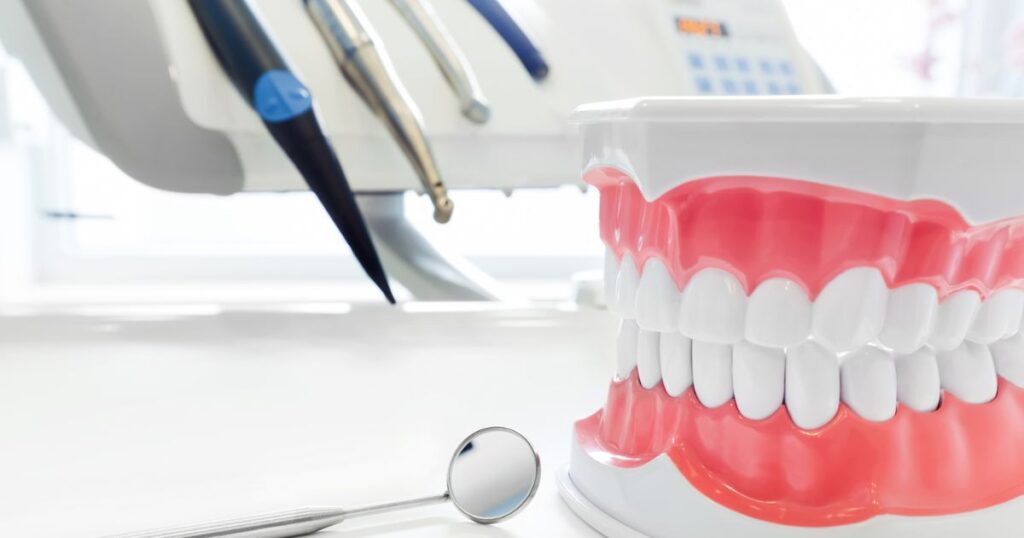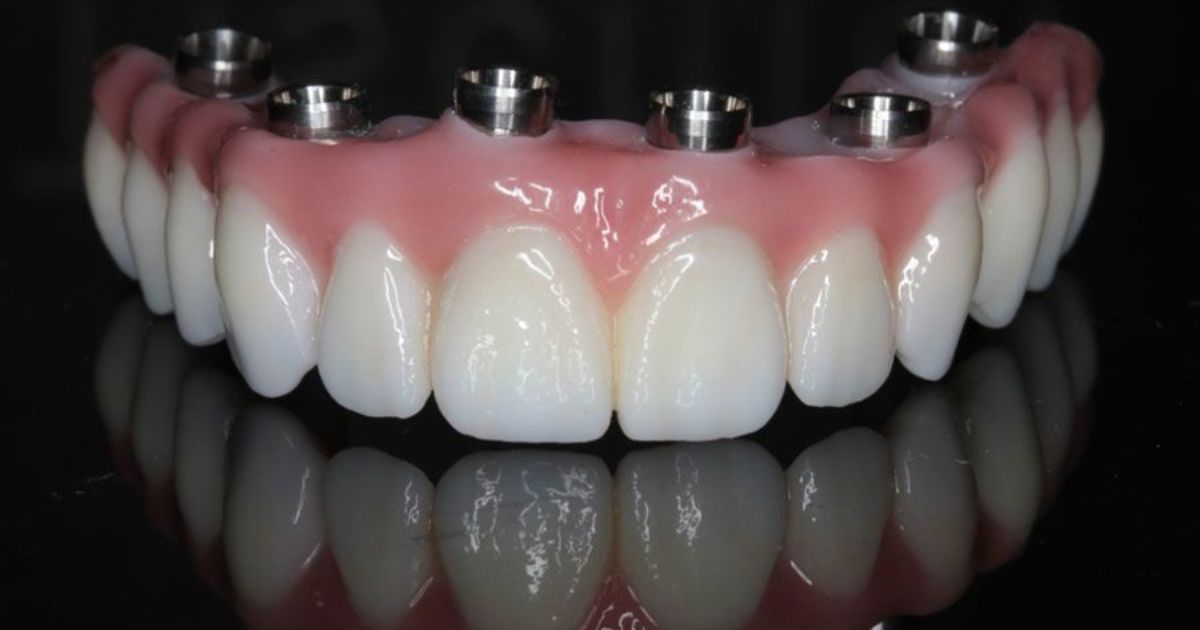Oral healthcare is important for overall health and quality of life. However, treatments like dentures and dental implants can be very expensive. This article explores more affordable options for restoring smiles through cheap dentures, implants, or a combination approach.
Losing teeth can negatively impact confidence and function. Basic dentures are the most cost-effective solution, starting around $1,000. While not permanent, dentures offer an immediate replacement at a lower price point. Dental implants provide a superior long-term solution but require major upfront costs.
Strategic placement of just a few implants to anchor partial dentures or retain a full denture can balance short and long-term considerations. This hybrid approach strengthens retention compared to dentures alone while slowing bone loss by $3,000 on average. Community clinics and dental schools also provide more affordable care. Developing a long-term plan and preventative care habits preserves any treatment’s value.
Dentures: An Affordable Tooth Replacement Solution

Dentures are a popular low-cost choice for missing teeth. Made of acrylic resin molded over models of the gums and mouth, full or partial dentures can restore confidence and function. While not permanently fixed like implants, dentures clip tightly into the mouth with suction and occasional adhesive for secure eating and speaking.
At around $1,000-$3,000 per arch, they provide an immediate replacement solution. For those unable or unwilling to fund implants, basic dentures remain a practical option – though occasional relines may be needed as gums shrink over time. An Upper Partial Denture is often a very affordable solution for replacing missing upper teeth, ranging from $500 to $1500 depending on the number of teeth and additional features.
Full vs Partial Dentures
Two denture types meet varying needs affordably. Full dentures replace all teeth in an arch, while partial dentures fill only missing tooth sites, utilizing remaining natural teeth for support and stability. For extensive tooth loss, low-cost full dentures may suffice. However, partial dentures preserve more of the mouth’s natural structure and proprioception which offers quality of life advantages.
Partial dentures attach to surrounding teeth with clasps or precision attachments. Both types of dentures may feel loose initially but with practice, wearers quickly adjust to the new sensation and regain function comfortably over a few weeks of use.
Custom Fit And Appearance Options
Off-the-shelf dentures lack customized fittings but deliver low upfront costs. However, ill-fitting dentures subject wearers to pain, oral hurts, and eating complications down the road. Ensure dentures receive sufficient tries-ins and adjustments by a denturist or prosthodontist for that perfect fit.
That extra service translates to higher comfort preventing future denture exchanges or relines. For improved esthetics, premium denture materials offer natural-looking tooth shades and gums. Stain-resistant surfaces better retain their original hue over time. Cosmetic variances add moderate charges but provide psychological benefits by preserving identity through a more youthful appearance.
Denture Care And Maintenance
Keeping dentures clean extends longevity between relines. Denture-safe brushes and detergents thoroughly remove plaque, calculus, and stains with gentle scrubbing over a sink full of water to prevent ingesting debris. An integrated water pick cleans hard-to-reach crevices. Soaking in diluted denture cleaner solutions daily further disinfects the surface.
Proper storage protects them from warping when not in use. For best fit, have relines done every 1-2 years as bone resorption occurs to prevent sore spots. With attentive hygiene and occasional adjustments as needed, basic dentures can last many years as a very cost-effective tooth replacement solution.
Dental Implants: A Long-Lasting Alternative
While more expensive upfront, dental implants provide a permanent solution simulating natural tooth root function. Comprised of biocompatible titanium posts surgically placed into the jawbone, implants fuse with living bone for stability over months. Abrasion-resistant crowns then screw onto implant heads, restoring full chewing ability and aesthetics indistinguishable from real teeth.
Implants outperform dentures by supporting chewing forces naturally without slippage. They preserve surrounding bone and prevent accelerated shrinkage associated with ill-fitting dentures. Though investment costs reach $3,000-$6,000 per tooth, dental implants last over 15 years on average versus ongoing denture maintenance fees over a lifetime.
Implant Procedure And Recovery
First, 3D imaging examines bone density to plan optimal site preparation. Minor surgery inserts mini screw implants which bond with jaw tissue over 3-6 months. During osseointegration, implantation achieves 98% success with supportive diets. Once fused, abutments securely latch precision crowns replicating natural tooth forms. Antibiotics may be prescribed during the initial healing stages.
While some soreness occurs during osseointegration, over-the-counter remedies suffice for post-operative comfort. With periodic cleanings, implants require no special care otherwise. Despite higher per-tooth costs, implants restore full mouth function with quality and durability far surpassing removable dentures.
Affording Massive Cost Savings In The Long Run
While upfront implant finances surpass periodic denture costs, factoring lifetime expenses inverts that relationship. Compared to average 60-year lifetime outlays, implants’ 20-year service equates to $1,500-$3,000 per replaced tooth – less than ongoing denture replacements incurring $1,000 every 5-10 years. Implants eliminate resorbing jawbone issues hastening denture instability over time.
Their permanence avoids recurring $200-$500 relines and new denture fees as bone adjusts. Finally, retained bone density from embedded implants supports less expensive repair costs versus extensive jaw grafting if switching to implants later. Overall, dental implants deliver superior function and comfort more cost-effectively long-term.
Financing Implant Treatment Affordably
Repayment programs let implants be scheduled gradually. Consultants evaluate finances to tailor low-interest monthly payments over 1-5 years instead of large upfront withdrawals. Delaying non-essential teeth reaps incremental savings. Crown Loan programs cover a single crown upfront, paying the remainder when recovered from work absences avoiding price shocks.
Some accept 0% interest offers upon rapid repayment while care continues. Dentists partnering with credit unions offer discounted implant bills covered by personal loans. Community health programs subsidize those with qualifying incomes. Overall, with diligent planning, implants restore self-esteem and nutrition affordably through installment plans spreading high initial fees reasonably.
Combination Treatment: Leveraging Each Option’s Strengths
A mixed approach balances upfront costs with long-term benefits. Strategic implant placement anchors dentures more securely in problem spots than ill-fitting suction-based dentures alone. This “hybrid” solution restores function inexpensively compared to an implant-only solution. For example, just four front implants joined by a fixed bridge secure snap-on dentures preventing slippage during speech or hearty chewing.
Such targeted implants combined with a partial denture preclude complete jawbone resorption long-term while avoiding the costs of comprehensive implant reconstruction. Consultations determine the most cost-effective blended solution based on individual clinical factors and budget.
Implant-Retained Dentures
This popular compromise inserts 2-4 implants in strategic jaw locations. A bar or other retainer mates the implants to an existing or new denture, holding it firmly in place. Unlike loose suction dentures, hybrid variants withstand side pressures permitting stable eating. Reduced bone loss over dentures alone delays eventual reconstruction timing and costs.
Retail dentures merely need relining less often versus repeated replacements. At around $3,000 total, the hybrid solution proves more affordable than 15+ implant reconstructions while vastly exceeding denture limitations. With proper care, implant-retained dentures restore full function affordably for decades.
Combination Advantages for Bone Preservation
Jawbone rapidly shrinks unstimulated by loose dentures over time, hastening edentulism and the need for extensive grafting. Strategic implant placement alongside dentures provides osteogenic stimuli halting this accelerated loss pattern. Preserved bone volume supports stable dentures better versus inflamed tissue associated with misfitting dentures alone.
Stable dentures protect remaining teeth from trauma or infection risk versus ill-fitting replacements prone to movement. Overall, a blended approach maximizes outcomes cost-effectively by balancing immediate cost-savings with the multiple long-term benefits of slowed atrophy – including the postponement of eventual reconstructive grafting or complete implant solution expenses by preserving underlying structure naturally.
Considering All Factors For Best Value
No single solution fulfills every need. Comprehensive consultations weigh clinical factors, lifestyle, finances, and longevity critically. Dentures suffice short-term yet deteriorate bone-holding dentures precariously. Implants restore function perfectly yet require substantial means. Blended options balance affordability with durability; four strategic implants retain dentures more securely than loose replacements while upholding bone longer term.
Establishing payment plans spreads costs reasonably. Prioritizing preventative care extends all solutions’ lifespan, offsetting costs. Ultimately, considering total lifetime expenses and oral health impacts presents the optimal restoration value based on individualized needs rather than raw price alone.
Preventive Care Prolongs Treatment Value
Daily brushing and flossing remove plaque below gumlines inaccessible by normal brushing alone. This prevents future gum disease exacerbating tooth loss and replacement costs. Professional cleanings every 6 months catch early issues before needing costly restorative care. Fluoride rinses, varnishes, and sealants applied by dentists strengthen enamel defense against decay over a lifetime.
These preventative strategies provide powerful returns by forestalling replacements and preserving bone supporting existing and future treatments very cost-effectively. Careful habits reduce long-term care needs, keeping all tooth replacement options functioning optimally for maximum value well beyond initial costs.
Choosing A Provider With Affordability In Mind
Finding a trustworthy, price-conscious provider completes value-based care. Dental schools and community clinics train next-generation professionals operating on tighter budgets. Procedure costs compare fairly to private practices. Bulk manufacturing labs produce basic dentures at lower facility overhead than custom mills. Home-try denture kits bypass costly office patterns.
Budget-conscious provider relationships encourage installment plans and care bundles ensuring ongoing affordability. Discounted memberships support predictable long-term care needs. Non-profit groups aid low-income applicants. Weighing individual practitioner philosophies and payment practices ultimately delivers restoration meeting both clinical and financial wellness priorities optimally.
Maintaining Oral Wellness For Life

Quality replacement solutions depend on diligent aftercare. Continue regular cleanings as gum disease risks persist. Request adjustments promptly addressing sore or loose areas. Limit processing hard foods unable to be chewed comfortably. Inspect the home regularly for signs of damage. Replace missing teeth to prevent shifting, further complications, and follow-up repair costs.
Control chronic conditions affecting oral tissues. Quit habits risking replacements. Inform dentists about medications impacting treatments. Prioritize nutrition, and minimize stresses jeopardizing the mouth. Adopting healthy long-term routines sustains maximum value from initial investments and quality of life through all stages of life.
FAQ’s
What is the cost of teeth implants in Pakistan?
The average cost of a dental implant in Pakistan ranges from 50,000 to 150,000 Pakistani rupees per tooth, depending on the type of implant and dental clinic.
What is the cheapest option for false teeth?
The cheapest option for false teeth is a basic set of dentures, which can cost as little as $500-$800 per upper or lower arch in some areas.
How much is the cheapest pair of dentures?
The cheapest pair of dentures, usually a basic same-day set of acrylic full dentures, costs between $500-$1000 in most parts of the United States. Some community clinics or dental schools may offer dentures for as low as $300-$500 per arch.
Conclusion
Tooth loss burdens millions worldwide lacking solutions due to prohibitive costs. This guide profiles affordable restoration avenues through basic dentures, partial coverage, selective dental implants, or blended approaches. Consider not just direct fees but lifetime expenses, risks to oral structure, function impacts and intangible comfort factors important to individual priorities and circumstances.
Value outweighs price when weighing proven durability and benefits over time versus short-term monetary savings. Maintenance devotion has kept all options serving the oral health needs sustainably for decades. With informed choices and preventative self-care habits, restored smiles remain attainable and lasting goals for all budgets.











